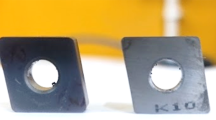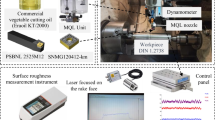Abstract
Superalloy Inconel 625 although having many industrial applications owing to its high strength, exhibits poor machinability because of its sticky nature and poor heat conductivity. To improve its machinability, use of cutting fluids becomes necessary to remove heat and provide lubrication in the cutting region. However, harmful effects of cutting fluids on environment and operator health restrict their application. Several efforts have been carried out to replace or minimize the quantity of conventional cutting fluids used in machining to strive for green machining and economizing machining operations. Nano-fluid minimum quantity lubrication (NMQL) technique has evolved as best alternative to flood conditions cooling /lubrication especially for machining of alloys like Inconel. This paper experimentally investigates the suitability of NMQL (carbon nanotube; CNT in vegetable oil) in machining of Inconel 625. The objective was to minimize tool wear and surface roughness under different machining conditions. Tool performance in NMQL was also compared with that under dry and flood conditions. The results revealed superiority of NMQL in terms of better tool life and improved surface finish over dry machining and nearly equivalent performance to wet (flood) machining thus provides the way forward for sustainable and environmental friendly machining.
Similar content being viewed by others
References
Çolak, O., “Investigation on Machining Performance of Inconel 718 in High Pressure Cooling Conditions,” Strojniški vestnik-Journal of Mechanical Engineering, Vol. 58, No. 11, pp. 683–690, 2012.
Senthilkumaar, J., Selvarani, P., and Arunachalam, R., “Intelligent Optimization and Selection of Machining Parameters in Finish Turning and Facing of Inconel 718,” The International Journal of Advanced Manufacturing Technology, Vol. 58, Nos. 9–12, pp. 885–894, 2012.
Thakur, D. G., Ramamoorthy, B., and Vijayaraghavan, L., “Investigation and Optimization of Lubrication Parameters in High Speed Turning of Superalloy Inconel 718,” The International Journal of Advanced Manufacturing Technology, Vol. 50, Nos. 5–8, pp. 471–478, 2010.
Dhar, N. R., Kamruzzaman, M., and Ahmed, M., “Effect of Minimum Quantity Lubrication (MQL) on Tool Wear and Surface Roughness in Turning AISI-4340 Steel,” Journal of Materials Processing Technology, Vol. 172, No. 2, pp. 299–304, 2006.
Sharma, A. K., Tiwari, A. K., and Dixit, A. R., “Effects of Minimum Quantity Lubrication (MQL) in Machining Processes Using Conventional and Nanofluid Based Cutting Fluids: A Comprehensive Review,” Journal of Cleaner Production, Vol. 127, pp. 1–18, 2016.
Singh, T., Singh, P., Dureja, J. S., Dogra, M., Singh, H., and Bhatti, M. S., “A Review of Near Dry Machining/Minimum Quantity Lubrication Machining of Difficult to Machine Alloys,” International Journal of Machining and Machinability of Materials, Vol. 18, No. 3, pp. 213–251, 2016.
Davim, J. P., Sreejith, P., and Silva, J., “Turning of Brasses Using Minimum Quantity of Lubricant (MQL) and Flooded Lubricant Conditions,” Materials and Manufacturing Processes, Vol. 22, No. 1, pp. 45–50, 2007.
Devillez, A., Le Coz, G., Dominiak, S., and Dudzinski, D., “Dry Machining of Inconel 718, Workpiece Surface Integrity,” Journal of Materials Processing Technology, Vol. 211, No. 10, pp. 1590–1598, 2011.
Thakur, D., Ramamoorthy, B., and Vijayaraghavan, L., “Influence of Minimum Quantity Lubrication on the High Speed Turning of Aerospace Material Superalloy Inconel 718,” International Journal of Machining and Machinability of Materials, Vol. 13, Nos. 2–3, pp. 203–214, 2013.
Shokrani, A., Dhokia, V., and Newman, S. T., “Environmentally Conscious Machining of Difficult-to-Machine Materials with Regard to Cutting Fluids,” International Journal of Machine Tools and Manufacture, Vol. 57, pp. 83–101, 2012.
Kamata, Y. and Obikawa, T., “High Speed MQL Finish-Turning of Inconel 718 with Different Coated Tools,” Journal of Materials Processing Technology, Vols. 192–193, pp. 281–286, 2007.
Sharma, V. S., Singh, G., and Sørby, K., “A Review on Minimum Quantity Lubrication for Machining Processes,” Materials and Manufacturing Processes, Vol. 30, No. 8, pp. 935–953, 2015.
Gupta, M. K. and Sood, P. K., “Machining Comparison of Aerospace Materials Considering Minimum Quantity Cutting Fluid: A Clean and Green Approach,” Proceedings of the Institution of Mechanical Engineers, Part C: Journal of Mechanical Engineering Science, Vol. 231, No. 8, pp. 1445–1464, 2017.
Dhar, N., Ahmed, M., and Islam, S., “An Experimental Investigation on Effect of Minimum Quantity Lubrication in Machining AISI 1040 Steel,” International Journal of Machine Tools and Manufacture, Vol. 47, No. 5, pp. 748–753, 2007.
Ezugwu, E., Bonney, J., Fadare, D., and Sales, W., “Machining of Nickel-Base, Inconel 718, Alloy with Ceramic Tools under Finishing Conditions with Various Coolant Supply Pressures,” Journal of Materials Processing Technology, Vols. 162–163, pp. 609–614, 2005.
Fratila, D. and Caizar, C., “Investigation of the Influence of Process Parameters and Cooling Method on the Surface Quality of AISI-1045 during Turning,” Materials and Manufacturing Processes, Vol. 27, No. 10, pp. 1123–1128, 2012.
Sreejith, P. S., “Machining of 6061 Aluminium Alloy with MQL, Dry and Flooded Lubricant Conditions,” Materials Letters, Vol. 62, No. 2, pp. 276–278, 2008.
Hadad, M. and Sadeghi, B., “Minimum Quantity Lubrication-MQL Turning of AISI 4140 Steel Alloy,” Journal of Cleaner Production, Vol. 54, pp. 332–343, 2013.
Srikant, R. R., Prasad, M. M. S., Amrita, M., Sitaramaraju, A. V., and Krishna, P. V., “Nanofluids as a Potential Solution for Minimum Quantity Lubrication: A Review,” Proceedings of the Institution of Mechanical Engineers, Part B: Journal of Engineering Manufacture, Vol. 228, No. 1, pp. 3–20, 2014.
Sahu, N. K., Andhare, A. B., and Raju, R. A., “Evaluation of Performance of Nanofluid Using Multiwalled Carbon Nanotubes for Machining of Ti-6Al-4V,” Machining Science and Technology, Vol. 22, No. 3, pp. 476–492, 2018.
Zhang, X., Zhou, W.-X., Chen, X.-K., Liu, Y.-Y., and Chen, K.-Q., “Significant Decrease in Thermal Conductivity of Multi-Walled Carbon Nanotube Induced by Inter-Wall Vander Waals Interactions,” Physics Letters A, Vol. 380, No. 21, pp. 1861–1864, 2016.
Khandekar, S., Sankar, M. R., Agnihotri, V., and Ramkumar, J., “Nano-Cutting Fluid for Enhancement of Metal Cutting Performance,” Materials and Manufacturing Processes, Vol. 27, No. 9, pp. 963–967, 2012.
Amrita, M., Srikant, R., and Sitaramaraju, A., “Performance Evaluation of Nanographite-Based Cutting Fluid in Machining Process,” Materials and Manufacturing Processes, Vol. 29, No. 5, pp. 600–605, 2014.
Uysal, A., Demiren, F., and Altan, E., “Applying Minimum Quantity Lubrication (MQL) Method on Milling of Martensitic Stainless Steel by Using Nano Mos2 Reinforced Vegetable Cutting Fluid,” Procedia-Social and Behavioral Sciences, Vol. 195, pp. 2742–2747, 2015.
Hegab, H., Umer, U., Soliman, M., and Kishawy, H. A., “Effects of Nano-Cutting Fluids on Tool Performance and Chip Morphology during Machining Inconel 718,” The International Journal of Advanced Manufacturing Technology, Vol. 96, Nos. 9–12, pp. 3449–3458, 2018.
Su, Y., Gong, L., Li, B., Liu, Z., and Chen, D., “Performance Evaluation of Nanofluid MQL with Vegetable-Based Oil and Ester Oil as Base Fluids in Turning,” The International Journal of Advanced Manufacturing Technology, Vol. 83, Nos. 9–12, pp. 2083–2089, 2016.
Khan, M. M. A., Mithu, M. A. H., and Dhar, N. R., “Effects of Minimum Quantity Lubrication on Turning AISI 9310 Alloy Steel Using Vegetable Oil-Based Cutting Fluid,” Journal of Materials Processing Technology, Vol. 209, Nos. 15–16, pp. 5573–5583, 2009.
Lawal, S. A., Choudhury, I. A., and Nukman, Y., “Evaluation of Vegetable and Mineral Oil-in-Water Emulsion Cutting Fluids in Turning AISI 4340 Steel with Coated Carbide Tools,” Journal of Cleaner Production, Vol. 66, pp. 610–618, 2014.
Mitsubishi Materials Corporation, “General Catalogue: C007B,” https://doi.org/www.mitsubishicarbide.com/application/files/6114/5698/5115/catalog_c007b_full.pdf (Accessed 25 SEP 2017)
Xue, C. and Chen, W., “Adhering Layer Formation and Its Effect on the Wear of Coated Carbide Tools during Turning of a Nickel-Based Alloy,” Wear, Vol. 270, Nos. 11–12, pp. 895–902, 2011.
Jahanbakhsh, M., Akhavan Farid, A., and Lotfi, M., “Optimal Flank Wear in Turning of Inconel 625 Super-Alloy Using Ceramic Tool,” Proceedings of the Institution of Mechanical Engineers, Part B: Journal of Engineering Manufacture, Vol. 232, No. 2, pp. 208–216, 2018.
Amini, S., Fatemi, M. H., and Atefi, R., “High Speed Turning of Inconel 718 Using Ceramic and Carbide Cutting Tools,” Arabian Journal for Science and Engineering, Vol. 39, No. 3, pp. 2323–2330, 2014.
Liu, Z., An, Q., Xu, J., Chen, M., and Han, S., “Wear Performance of (nc-Altin)/(a-Si3N4) Coating and (nc-AlCrN)/(a-Si3N4) Coating in High-Speed Machining of Titanium Alloys under Dry and Minimum Quantity Lubrication (MQL) Conditions,” Wear, Vol. 305, Nos. 1–2, pp. 249–259, 2013.
Nam, J. S., Lee, P.-H., and Lee, S. W., “Experimental Characterization of Micro-Drilling Process Using Nanofluid Minimum Quantity Lubrication,” International Journal of Machine Tools and Manufacture, Vol. 51, Nos. 7–8, pp. 649–652, 2011.
Sharma, A. K., Tiwari, A. K., Singh, R. K., and Dixit, A. R., “Tribological Investigation of TiO2 Nanoparticle Based Cutting Fluid in Machining Under Minimum Quantity Lubrication (MQL),” Materials Today: Proceedings, Vol. 3, No. 6, pp. 2155–2162, 2016.
Author information
Authors and Affiliations
Corresponding author
Additional information
Talwinder Singh Ph.D. candidate in the Department of Mechanical Engineering, Punjabi University, Patiala-INDIA. His areas of interest are machining of aerospace alloys under minimum quantity lubrication machining/near dry machining, green manufacturing and tool wear monitoring.
Jasminder Singh Dureja Professor in the Department of Mechanical Engineering, Punjabi University, Patiala-INDIA. His areas of interest are hard turning, tool wear, condition-based maintenance and monitoring apart from statistical modelling and optimisation, machining of aerospace alloys under minimum quantity lubrication machining/near dry machining, green manufacturing, etc.
Manu Dogra Associate Professor in the Department of Mechanical Engineering, UIET, PUSSGRC, Hoshiarpur-INDIA. His area of interest includes machining, statistical modeling, welding and MQL machining.
Manpreet S Bhatti Associate Professor in the Department of Botanical and Environmental Sciences, Guru Nanak Dev University, Amritsar-INDIA. His areas of interest are design of experiments (DOE), statistical modelling, artificial neural network modelling, response surface methodology and process optimization.
Rights and permissions
About this article
Cite this article
Singh, T., Dureja, J.S., Dogra, M. et al. Environment Friendly Machining of Inconel 625 under Nano-Fluid Minimum Quantity Lubrication (NMQL). Int. J. Precis. Eng. Manuf. 19, 1689–1697 (2018). https://doi.org/10.1007/s12541-018-0196-7
Received:
Revised:
Accepted:
Published:
Issue Date:
DOI: https://doi.org/10.1007/s12541-018-0196-7




